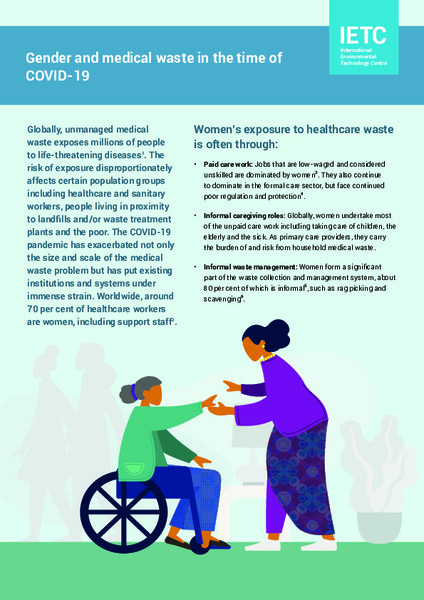| dc.contributor | Economy Division | en_US |
| dc.contributor.author | United Nations Environment Programme | en_US |
| dc.contributor.author | International Environmental Technology Centre | en_US |
| dc.coverage.spatial | Global | en_US |
| dc.date.accessioned | 2022-12-27T05:43:56Z | |
| dc.date.available | 2022-12-27T05:43:56Z | |
| dc.date.issued | 2022-12 | |
| dc.identifier.uri | https://wedocs.unep.org/20.500.11822/41532 | |
| dc.format | pdf | en_US |
| dc.language | English | en_US |
| dc.relation.ispartof | The waste management sector has seen significant impacts from the burgeoning COVID-19 waste problem. To ensure the most vulnerable groups are adequately protected, it is important to mainstream gender into COVID-19 related strategy and planning, resource allocation and institutional development. | en_US |
| dc.rights | Public | en_US |
| dc.subject | waste management | en_US |
| dc.subject | COVID-19 | en_US |
| dc.subject | medical waste | en_US |
| dc.subject | gender mainstreaming | en_US |
| dc.subject | woman | en_US |
| dc.title | Gender and Medical Waste in the Time of COVID-19 | en_US |
| wd.identifier.sdg | SDG 1 - No Poverty | en_US |
| wd.identifier.sdg | SDG 3 - Good Health and Well-being | en_US |
| wd.identifier.sdg | SDG 5 - Gender Equality | en_US |
| wd.identifier.sdg | SDG 6 - Clean Water and Sanitation | en_US |
| wd.identifier.sdg | SDG 10 - Reduced Inequalities | en_US |
| wd.identifier.sdg | SDG 11 - Sustainable Cities and Communities | en_US |
| wd.topics | Chemicals and Pollution Action | en_US |
| wd.identifier.pagesnumber | 4 p. | en_US |


